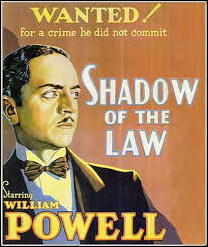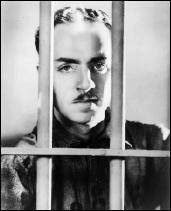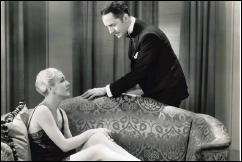Wed 5 Feb 2014
Reviewed by Dan Stumpf: SHADOW OF THE LAW. (1930)
Posted by Steve under Crime Films , Reviews[3] Comments

SHADOW OF THE LAW. Paramount Pictures, 1930. William Powell, Marion Shilling, Natalie Moorhead, Regis Toomey, Paul Hurst, George Irving, Frederick Burt. Screenwriter John Farrow, based on the novel The Quarry by John A. Moroso (Little, Brown, 1913). Director: Louis Gasnier.
Back in 1922 a man named Robert Elliott Burns was sentenced to hard labor on a Georgia chain gang for his part in an armed robbery that netted him and two other men less than six dollars. Probably only Steve and Walter are old enough to remember, but Burns escaped from the chain gang and made a new life for himself under another name, eventually becoming a prominent businessman in Chicago and something of a celebrity when his wife (who had been blackmailing him) betrayed him to the law after getting a cash settlement from him in exchange for a divorce.
Burns could have fought extradition but agreed to return to Georgia when corrections officials there promised him quick release after some nominal service. Instead, they reneged on their promise and he was returned to the chain gang for “extra attention†from the guards, with no release in sight. Eventually Burns escaped again and wrote I Am a Fugitive from a Georgia Chain Gang (Vanguard, 1932), which finally secured his freedom.

Burns is best remembered for the movie made from his book, but his personal story seems to have been much on the mind of John Farrow, screenwriter of the film Shadow of the Law, which appeared a full two years before I Am a Fugitive hit the bookstands and movie screens.
The story in Shadow of the Law is slightly changed, but the essential elements are there: William Powell stars as a decent if amorous gentleman who gets in a scrape over a lady (perennial vamp Natalie Moorhead) and ends up accidentally killing a man—whereupon Ms. Moorhead, fearing scandal or worse, promptly decamps, leaving Powell with no witness to clear him of a murder charge that sends him to prison.
A few years later, Powell is a hardened-enough convict to pal up with a thief (well played by Paul Hurst) and exploit the warden’s trust in him to break out of jail. When we next see him, he has become a highly-placed executive, respected by the workers in his factory and engaged to the owner’s daughter — but determined to find Moorhead and clear his name.

He does eventually find her, or rather Hurst does, but she proves smarter than Hurst thought and more avaricious than Powell suspected, leading to some plot twists both melodramatic and highly entertaining.
In fact, the writing and direction (by Louis Gasnier) in Shadow keeps the story right on its edge, offering some juicy plot twists and a couple of suspenseful moments, one of which – as I realized what Powell was going to do to himself and watched him calmly set about it — I swear made my skin crawl. Director Gasnier is not well known as an auteur (unless you count Reefer Madness) but his work here shows a stylishness and pace perfectly suited to the subject.
February 5th, 2014 at 6:46 pm
Despite REEFER MADNESS I’ve seen a few stylish films by Gasnier, but if I remember they had screenplays by more talented and better known individuals like Farrow.
Burns story was still inspiring movies as late as Sturgis SULLIVAN’s TRAVELS which takes a bit of inspiration from it. Though the novel this is based on well predates Burns book it doesn’t mean the film wasn’t based as much or Burns as the book.
Powell is always worth watching, he’s interesting to watch, and this early on he’s still transitioning from a silent villain (BEAU GESTE and if I remember right the early talkie BEAU SABREUR with Gary Cooper)to a leading man.
February 10th, 2014 at 12:11 pm
My son has recently discovered Powell’s early films and he’s been raiding my collection for films. He won’t get “Shadow of the Law” from me since I don’t have a copy and have never seen it, more’s the pity.
Steve may object to being lumped into an age category with me, but I’m amused by Dan’s thinking either of us would have a memory that stretches back to 1922. Still, a fine review that provides some interesting background information that does link up with an era that I might have some familiarity with. By the way, the first film I saw in a theater (after my father refused to take me to any more ballgames because I wouldn’t sit still and ran all over the bleachers and turned me over to my mother who preferred movies to sports) was “It Happened One Night.” And “I Was a Fugitive…” never figured in my early movie going.
February 10th, 2014 at 7:22 pm
One of Powell’s best early films is Private Detective 62 where he plays a disgraced diplomatic agent who returns to the states and becomes the lady killing partner of a two bit private detective. Better still the film is Raoul Whitfield’s only screen
story. Jewel Robbery is a good one too with Powell — well that one is obvious.
And whether you love or hate Joan Crawford check out The Last of Mrs. Cheyney with Powell a jewel thief using Crawford to case nobleman Robert Montgomery’s estate. Nigel Bruce and C. Aubrey Smith are in it too. Powell has some fun posing as the butler.